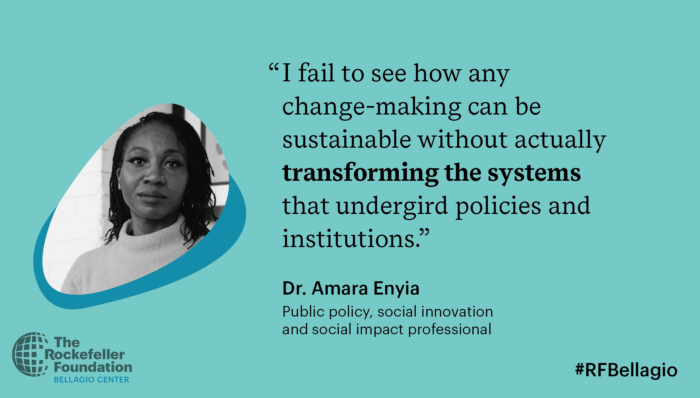Editor’s note: Dr. Amara Enyia calls herself a bridge builder. She comes from a legacy of activism, “from my great grandmother who initiated one of the largest uprisings against the British back in 1929, to my parents, who fought in Nigeria’s civil war because of the genocide that was taking place.”
She grew up near Chicago, and her parents impressed upon her and her five siblings that every gift, skill, and talent they had must be used in service of others, she said.
A public policy, social innovation and social impact professional with experience in Central Asia, Africa, Latin America and the Middle East, she writes extensively on issues of education, economic development, fiscal policy, equity in policy and systems thinking. Dr. Amara Enyia organized and led a convening on “Reparative Justice for Historical Crimes” at the Bellagio Center in July 2022.
How is your work helping to build a more racially and economically just society?
I’ve always been in the space of systems building. I’ve always thought in terms of systems, and applied that thinking to change-making. I fail to see how any change-making can be sustainable without actually transforming the systems that undergird policies and institutions.
The lens through which I approach this work is that there always has to be a philosophical underpinning for a system. It informs the function of that system. That, to me, is built on a philosophy of profit, greed, exploitation, extraction, destruction, harm. It’s the reason why everything’s falling apart, frankly. And so, when we think about how to change things and what must drive change, it has to be a different philosophy that undergirds the systems that we build. And so a philosophy of repair, or a notion of reparatory justice, has to fundamentally acknowledge the fact of human dignity, regardless of the categories that we create to develop hierarchies. This was the focus of the convening I helped to organize at the Bellagio Center last year, which launched a global advocacy and campaign infrastructure, to support reparations advocates around the world.
What breakthroughs do you envision needing to happen by 2050 for us to arrive at the racially and economically just society that you envision?
We want to make it clear that reparatory justice is not unique to the United States: there has to be a global reparations movement. This means that even if you’re doing work domestically in the United States, you still have this larger context.
The reparations and racial healing convening that we did in the Bellagio Center was an opportunity to bring together people who are doing work in the reparation space around the world in different contexts. We invited a diverse group of people from various parts of the world, from the continent, from the Caribbean, from Europe, and from the U.S. to engage in the week of dialogue. We also were intentional about including those who had been involved in reparations work from a different angle.
So, my approach to reparations is actually quite different from how it’s typically discussed. It’s really more of a world-building endeavor. A lot of my work actually focuses on global economic systems, our monetary policy on multilateral institutions, multilateral development banks – all of these institutions that were essentially created to perpetuate the exploitation largely from the transatlantic slave trade.
If we’re going to actually repair things, then the systems themselves have to change. This means moving the conversation away from just discussions around the price tag of reparations. What’s needed is a deeper and more nuanced conversation about how we structure systems in ways that are not exploitative, that repair harm, that acknowledges human dignity, and that take into account the value of people regardless of where they live, and where they exist.

What keeps you up at night and what makes you feel optimistic about the future?
What makes me feel optimistic about the future is that there is such a groundswell of interest and enthusiasm without the fear. That’s extremely exciting because then it takes it away from just a few individuals who happen to meet in the Bellagio Center, and it turns into something that can be transferred to the masses.
I think these platforms that we’re now building, coming out of the Bellagio Center are illuminating the possibilities for the entire world. That means that everything can change. We can actually connect with other people who are now coming into awareness. There are so many new people that are brought into the space who are connecting the dots – that’s very clear. This is amplifying the work and amplifying the possibilities.
Learn More: Discover the latest from the Global Circle for Reparations and Healing, and follow Amara on Twitter.